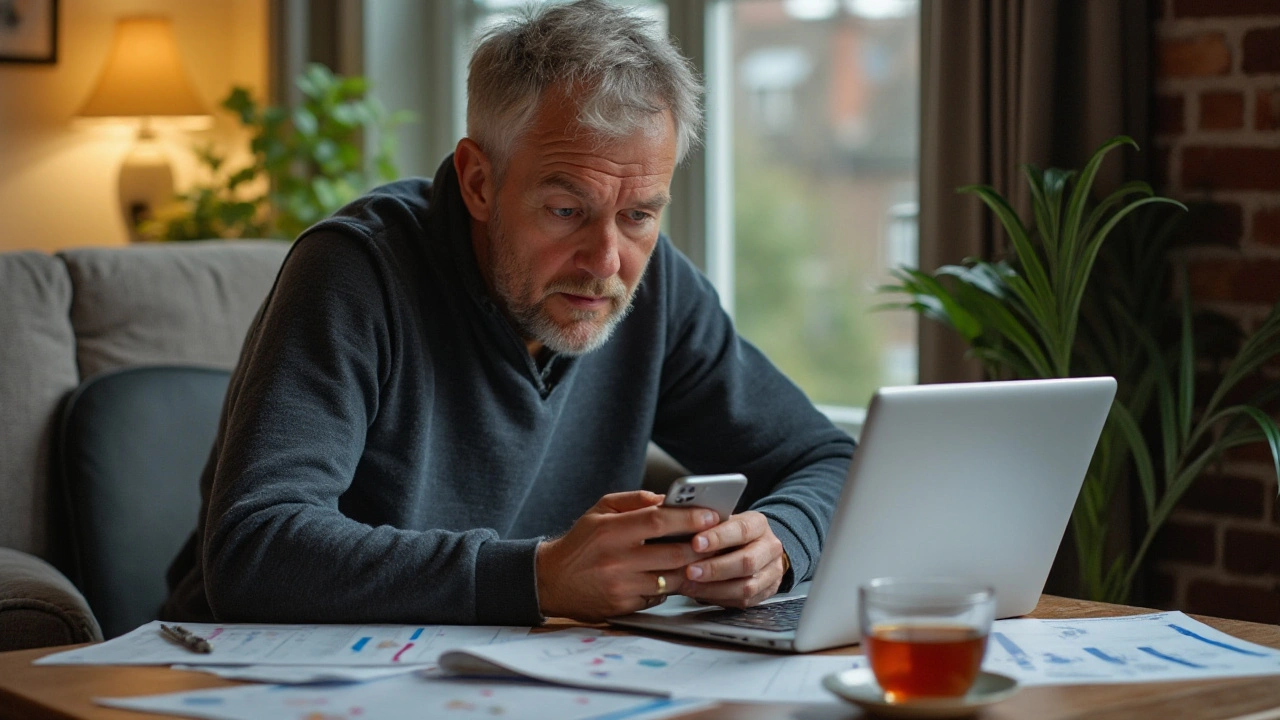
In our fast-paced world filled with endless information and mounting pressures, many people find themselves fixated on health. Health anxiety, a condition that leads individuals to excessively worry about their well-being, often despite having no serious medical conditions, can be overwhelming. These worries might stem from a fear of developing illnesses or a misinterpretation of bodily sensations.
Understanding this anxiety is crucial in managing it effectively. Various patterns and triggers can exacerbate health anxiety, and recognizing them is the first step toward gaining control. The psychological effects are real and can impact daily life significantly.
Yet, there's hope in coping mechanisms and strategies that can mitigate these anxious thoughts. From mindfulness to seeking professional help, numerous ways can support peace of mind. Join us as we delve deeper into the nature of health anxiety, its triggers, and how to navigate through the journey of managing these concerns.
- What is Health Anxiety?
- Common Triggers and Patterns
- Psychological Impacts
- Coping Strategies and Tips
What is Health Anxiety?
Health anxiety is more than just worrying about your next doctor's visit; it's a constant and often overwhelming fear about having a serious medical condition. This unease is grounded in the relentless checking and researching of symptoms, which leaves the sufferer unable to trust medical experts who might assure them of their good health. Even minor symptoms can spiral into a major preoccupation, dominating daily life and impairing social and occupational functioning.
The roots of health anxiety can be deep and multifaceted. It often starts with an instance or a combination of experiences where an individual's health feels threatened—whether through a personal health scare, witnessing someone else's illness, or simply reading harrowing statistics. These incidents rewire the way the brain processes incoming information about health, leading it to jump to catastrophic conclusions without substantial evidence.
Interestingly, health anxiety has been linked to a deeper psychological issue: the fear of uncertainty. The constant 'what if' scenarios keep people trapped in a cycle of checking and reassurance-seeking. Studies suggest that cognitive processes like selective attention to health threats and misinterpretation of bodily sensations are common amongst those with health anxiety. This condition is not always visible from the outside; thus, it often goes neglected by those who live with this silent burden.
In one insightful study published in an American health journal, it was noted that "in people with health anxiety, everyday aches and pains are transformed into evidence of serious illness." Such transformations are not mere exaggerations but reflections of their genuine internal experiences, highlighting the need for empathy and understanding.
An important aspect of dealing with mental health conditions like health anxiety involves knowing that it's not just about being over-cautious. Many times, individuals feel their concerns dismissed, leading to feelings of isolation. Normalizing this condition and educating loved ones about it can help reduce the stigma and encourage open conversations about mental well-being.
Addressing health anxiety requires not just an individual effort but also a societal shift in understanding mental health as integral to being human. In a world where health information is vast and sometimes overwhelming, finding a balance in processing this information without defaulting to anxiety can be a significant relief and achievement for those who battle daily with this condition.

Common Triggers and Patterns
Health anxiety, often an exhausting journey of constant worry, doesn't arise out of nowhere. It usually emerges due to various triggers and patterns that are intricately woven into one’s experiences and perception of well-being. A common trigger involves exposure to medical information, especially when it is sensationalized or catastrophic in nature. Many people who are predisposed to anxiety find themselves spiraling after reading or hearing about symptoms, particularly if they mirror the individual’s present concerns. This is amplified by the availability of health information on the internet, where self-diagnosis, often termed cyberchondria, contributes heavily to health anxiety. In such instances, a simple heads-up about a benign condition can be misinterpreted, magnifying fears into something gargantuan.
Another significant pattern is a past experience with illness or loss, either personal or within close relationships. Those who have faced serious health crises or have lost loved ones to disease might develop a heightened sensitivity to bodily sensations, interpreting every minor ailment as a potential threat. Their memories and emotions function like a lens, distorting reality and leading to disproportionate anxiety responses. An individual’s personality traits also play a pivotal role; those with a tendency toward perfectionism or excessive conscientiousness can be more prone to scrutinizing their health status. This introspective tendency encourages a relentless cycle of checking, reassurance-seeking, and constant self-monitoring.
Stress is a well-known catalyst for various types of anxiety, and health anxiety is no exception. When life throws chaos on our path, stress hormones flood our system, and suddenly, everything feels overwhelming, including our health. Stress doesn’t just complicate our daily lives; it alters the way we process bodily signals, making us more alert to unusual sensations we might otherwise overlook. In states of high stress, benign aches or a fleeting headache might be misperceived as something grievous, igniting the flame of health anxiety. Identifying these patterns and triggers is paramount, as it brings an individual's awareness to the aspects of life that need to be moderated or approached with more mindfulness.
"The mind is its own place, and in itself can make a heaven of hell, a hell of heaven." - John Milton, highlighting the intrinsic power of our mindset in perceiving our realities.
There’s also a social aspect, as interactions and cultural viewpoints can perpetuate health-related concerns. People often absorb worry from their environment, whether it's through conversations at a family gathering that's focused on ailments or societal emphasis on appearances and health. Cultural norms dictating that one must always be vigilant about their health can embed layers of guilt and pressure, fueling constant health checks. Recognizing these patterns is not just about minimizing worry but about reclaiming one's life from the grips of unnecessary fear.
Even media and advertisements have a substantial influence on triggering health anxiety. Commercials advocating for the next best thing in health supplements or pharmaceuticals create an illusion of needing to combat future illnesses before they even manifest. This marketing approach thrives on our vulnerability to protect, prevent, and sometimes, obsess over possible health risks. By being mindful of these entrenched societal and psychological triggers, individuals can slowly start unraveling the knots of worry, finding healthier pathways to perceive their health and wellbeing.

Psychological Impacts
Experiencing health anxiety can be mentally exhausting. The constant cycle of worry leads people to search for symptoms online, a phenomenon humorously dubbed 'cyberchondria'. Despite its amusing name, this behavior amplifies fears and can result in perpetual anxiety about one's health. The strain from this spiraling thought process often affects the mind deeply, leading individuals to experience persistent stress and heightened alertness to body cues.
People dealing with health anxiety often find it hard to trust medical assessments. Their conviction that something is wrong makes reassurance from health professionals seem insufficient. Such distrust affects the person’s sense of security, bubbling into other aspects of their life, from relationships to work dynamics. Mentally, this skepticism causes unending anxiety, sometimes advancing to panic attacks or depression, dragging down the quality of daily life.
The emotional toll of health anxiety frequently leads to social withdrawal. Those burdened by the condition might avoid contact with loved ones, fearing their health worries may seem irrational. Their persistent search for solace often gives rise to feelings of isolation, as others can't grasp the gravity of their fears. Social lives shrink, while hobbies and once-enjoyed activities lose appeal, resulting in a cycle that perpetuates sadness and despair.
A British study highlighted a correlation between health anxiety and decision-making. The stress of worrying about illnesses can muddle the thought process, impacting daily decisions. This scenario, common in those grappling with health anxiety, leads to indecisiveness and is accompanied by a heightened need for reassurance in trivial matters. Over time, this dependency exacerbates anxiety levels, feeding into the cycle of worry.
Chronic anxiety isn’t just an emotional and cognitive intruder; it affects the body too. Stress and anxiety can lead to physical symptoms such as headaches, increased heart rates, and even insomnia. Research from the American Psychological Association has shown that prolonged stress can weaken the immune system, leaving individuals more susceptible to illnesses. Ironically, this fuels the very anxiety about health that sufferers fear.
Living with constant dread is taxing on mental health. People often find themselves, unknowingly, slipping into constant introspection around their health. They dwell on every symptom, convincing themselves they are right.
"The joy of living is often lost in the shadow of continual worry," states Dr. Lisa Feldman, a renowned psychologist in the field of anxiety disorders.This shadow can cover moments of happiness, making them rare and brief.
Enabling oneself to break free from the clutches of health anxiety is imperative. Though challenging, recognizing the psychological impacts can be eye-opening and push individuals toward a more balanced mindset. Establishing a conversation about these impacts and raising awareness can help destigmatize the struggles many face. Understanding that these psychological impacts are real and not a sign of weakness is crucial in the journey toward healing.

Coping Strategies and Tips
Dealing with health anxiety requires a nuanced approach, blending psychological insight, practical actions, and sometimes, professional help. One of the first steps in battling this form of anxiety is recognizing it for what it is—anxiety rather than a physical health problem. This can be incredibly freeing for someone who has been weighed down by endless worries about their health. To navigate through this, consider developing a thorough understanding of your own anxiety patterns. Journaling can be an excellent tool for this. When you document your symptoms and feelings regularly, you often notice patterns and triggers that you might overlook otherwise.
Engaging in mindfulness and relaxation techniques can also be invaluable. Practices such as deep breathing, meditation, or yoga can help to calm the mind and bring it back to the present moment. When you feel the familiar wave of anxiety start to rise, pause and take a few calm, slow breaths. Focus on the air entering your lungs, and think only of the breath going out. This simple act can make a surprising difference.
Dr. Claire Weekes, a pioneering figure in anxiety treatment, famously suggested that 'facing, accepting, floating, and letting time pass' are crucial steps in overcoming anxiety. Her mantra of "don't fight, float" encourages individuals to refrain from resisting the anxiety and to allow it to pass over like a wave.Additionally, physical exercise should not be underestimated; it is a powerful tool in managing anxiety. It does not have to be a vigorous workout—a daily walk or gentle stretching can significantly improve your mental state. Physical activity increases endorphins, which are natural stress-relievers, and it provides a sense of accomplishment that boosts mood.
Another effective strategy is to limit the amount of health information you consume online. The internet can be a minefield of worst-case scenarios and alarming medical stories that might not even be relevant to your situation. Try scheduling "worry time," where you allow yourself a short, dedicated time to address anxieties without letting them take over your day. Limiting exposure to health data can prevent spirals of fear and keep anxieties at bay.
Sometimes, the best route to managing your mental health is through professional support. Therapy, particularly Cognitive Behavioral Therapy (CBT), is highly effective for treating health anxiety. A therapist can work with you to challenge irrational thoughts and help you develop healthier coping strategies. In some cases, medication might be prescribed to help manage the symptoms better. Seeking help is a courageous step and should be seen as a sign of strength in pursuing well-being. Follow these insights and allow them to guide you towards a calmer, more confident self.





